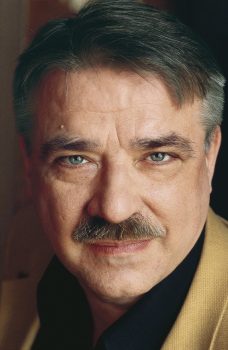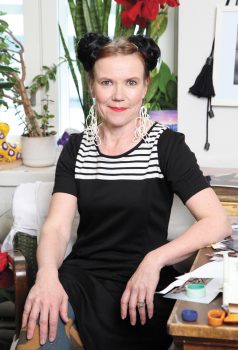Tag: short story
The rocket
Issue 3/1988 | Archives online, Fiction, Prose
Raketen (‘The rocket’), a novella from the collection Den segrande Eros (‘Eros triumphant’), 1912. Introduction by George C. Schoolfield
The sun shone straight in through the veranda’s little windows that made the whole ‘villa’ resemble a hothouse. With a sigh, Elsa let the morning paper fall to the floor; she had gotten halfway through the classified ads: ‘Three lads wish to correspond with likeminded lasses.’ ‘If Mr Söders-m does not fetch his effects, left as bond for unpaid rent, within a week, they will be regarded as our property, and his name will be published in toto.’ Now she could stand no more. The air seemed to come from a bakeoven. Listlessly, she watched two flies as they flicked the ceiling paper in their humming dance of love. It seemed as though knives were being thrust into the back of her head; that was the way her sick headaches began. A long walk might stop it, she knew, but she felt too tired.
At last, she was able to make herself get up and open the door for some fresh air. But with the air she got a powerful smell of roasting pork from the baker’s villa; the yells of the children playing cops and robbers up on the rock were doubled in force. A nasty stabbing sensation began in Elsa ears. And so she decided to take a walk after all, but only to the steamboat jetty. More…
In the north
Issue 3/1988 | Archives online, Fiction, Prose
A short story from Luvaton elämä (‘Forbidden life’, 1987). Introduction by Tero Liukkonen
I
I went up north in a sleeping car. It was a relief to see that even in Tampere there was a sign on the car saying ‘Kemijärvi’. That meant I could sleep the whole way. I had the lower berth; a couple more like me were sleeping in the same compartment – just ordinary women. I was nevertheless silent and reserved, so that neither of them would want to make me into a travelling companion. And they did leave me in peace.
I read for a bit, till I began to feel more at home, and settled down to sleep with my woollen socks on. I deliberately went almost to sleep while not wanting to drop off completely; and I gradually reached a point where I didn’t know which direction the train was going in. That was liberating. It was all the same which direction we were going in. The motion of the train got through to my nerves and started releasing things. More…
The Blinking Doll
Issue 2/1988 | Archives online, Fiction, Prose
A short story from Metsästys joulun alla (‘The hunt before Christmas’, 1982). Introduction by Erkka Lehtola
There was a strong bond between Juutinen and Multikka: both their lives, from their beginnings, had been fragmented and scattered, lacking any solid, reliable points of support. Even their marriages had come and gone; they had left no residue worth remembering. As in the old parable, their lives resembled the trail a skier leaves in fresh snow in a blizzard: behind him, it disappears in a few moments without a trace, and ahead and on either side there is only pristine density and no one or nothing one might follow. More…
The lake
Issue 2/1988 | Archives online, Fiction, Prose
Järvi (‘The lake’), a short story, 1915. Introductions by Kai Laitinen and Pekka Tarkka
I travel the world, not out of any desire for adventure, but because that is the way things have happened. The best of my wanderings are in obscure, tucked-away regions, where life is humdrum and pitched in a low key. There I have no need to stave off nostalgia for the past by leading a hectic life: my days go by in stolid succession from season to season, I am an ordinary unimportant individual among all the rest. For long stretches of time my life does not strike me as being either dull or bright; I derive a certain satisfaction from its very emptiness. It is as though I were, by degrees and to the best of my ability, paying off a kind of debt. More…
The tower
Issue 4/1987 | Archives online, Fiction, Prose
A short story from the collection Torni (‘The tower’, 1987). Introduction by Erkka Lehtola
The dog came through the door first, a big, long-haired brute. He hadn’t said anything about it on the phone, but from the look on his face you could tell it was his and that he meant to take it with him into the forest.
He shuffled across the yard with his rubber boots on and a rucksack on his back. In one hand he held a camera tripod.
I rolled down the window.
‘Wait a minute,’ he said.
He walked behind the cars standing in the parking lot, over to his own car and opened the trunk. The dog twisted around his legs whining softly. He took something out and slammed the trunk shut. More…
Three short stories
Issue 2/1987 | Archives online, Fiction, Prose
from Väärinkäsityksiä (‘Misconceptions’). Interview by Markku Huotari
Love
Kaija couldn’t understand why she felt like laughing all the time.
‘As for me, what I stand for is good old-fashioned courtesy,’ he pointed out.
He’d got a soft, low, caressing voice. He rested his hand on Kaija’s shoulder. They’d got that far already. Kaija had decided to say yes, even though he hadn’t suggested anything yet. She was beginning to picture luxurious rooms, gourmet dishes, expensive drinks, and tender, passionate lovemaking.
‘Socially I’m a radical,’ he said. ‘Culturally a liberal, but in personal things an unshakeable conservative. A woman, in my view, is to be respected – I don’t consider that damaging to her independence. Too often, in today’s world, equality’s used to justify what are quite simply bad manners.’ More…
A small lie
Issue 2/1987 | Archives online, Fiction, Prose
A short story from Pieni valhe (‘A small lie’). Introduction by Marianne Bargum
The white cat had started to hate her.
Only half a year ago, Marja remembered, it had been playing with the hems of her robe, while she had passed the morning reading and drinking coffee. Right now it was staring relentlessly at her from the bookcase where it was ensconced: out of reach, she thought. Its stare was green and mean. At night it attacked her ankles; it lurked in the crevices of the apartment and when it heard her approaching steps it leapt past her, screaming, and crossed the room to the curtains or the table. The curtains fell, books crashed to the floor, the cat stared with its eyes opened wide, the pupils like narrow slits. She would lock the cat into the other room for the night, hear it mew and feel the door with its paws; she fell asleep only after the cat had calmed down. When she approached it during the day, stroked it and called its name, it looked at her, motionless, as if it had seen and known everything, and then she withdrew her hand, backed off, started behaving as if there wasn’t even a cat in the apartment. More…
One night stand
Issue 1/1987 | Archives online, Fiction, Prose
Stories from Yhden yön pysäkki (‘One night stand’, 1985) and Unohdettu vartti (‘The forgotten quarter’, 1986). Introduction by Pekka Tarkka
At the beginning of November it really started to freeze. A month earlier than usual. There was little snow to speak of, but the ground froze hard as bone.
Tamed by hunger, reindeer clustered along the roadsides and on the village outskirts. Many of them ended their misery by flinging themselves under the timber-lorries in the evening dark. Bony and bloody carcasses littered the ditches and field-edges.
Then the snowstorms came. It snowed without stop for nearly two weeks. At times the whole landscape was reduced to a white line. Snowdrifts mounted round the houses and up the snow fences. The reindeer carcasses lay about under the snowbanks, waiting for spring. More…
The Vatican
Issue 3/1986 | Archives online, Fiction, Prose
A short story from Maan ja veden välillä (‘Between land and water’, 1955). Introduction by Pirkko Alhoniemi
At the top of the hill there was a cow barn with all kinds of trash scattered along its walls: rusty pails, pottery shards, old shoes, all the stuff country people toss onto rubbish heaps. The clucking of chickens and bleating of sheep filled the air. As I was running across the barnyard I had an idea that a chicken had probably just laid an egg on the grass or was looking for some place to lay an egg, because it was letting out such sharp scolding cries.
Many of us were running across the yard and in back of the cow barn. If I hadn’t been on my way to the Vatican I would have stayed to pat a calf that was rubbing its side against a wall of the cow barn in the glow of the rising sun. But I was in a hurry. I didn’t dare let the women out of my sight because I couldn’t find the way by myself, I couldn’t even remember exactly where I had joined the crowd. I had just seen them running by and while I hadn’t intended to start off for the Vatican just that day, I went along with them anyway. More…
The Cheap Contractor
Issue 2/1986 | Archives online, Fiction, Prose
From Kauan kukkineet omenapuut (‘Long-blossoming apple trees’, 1982). Introduction by Arto Seppälä
The men who delivered the hot-water cylinder offered to do the installation as well. I asked how much it would be. They lolled about a bit, exchanged a few private looks, pretended to be thinking. Then one of them fired off a sum. It was three times the quotation I’d already had. They didn’t even look at the location. I told myself I wouldn’t even go to the end of the road with big-dealers like these.
The same evening I rang up ‘a little man’ and told him he could get started as soon as it suited him.
The cheap contractor turned up a couple of days later, driving an elderly van into the yard. I went out. He’d sat himself down in a garden chair near the white lilacs. The morning sun only partially reached there; so half his body was in shade, looking colder than the sunny half. More…




